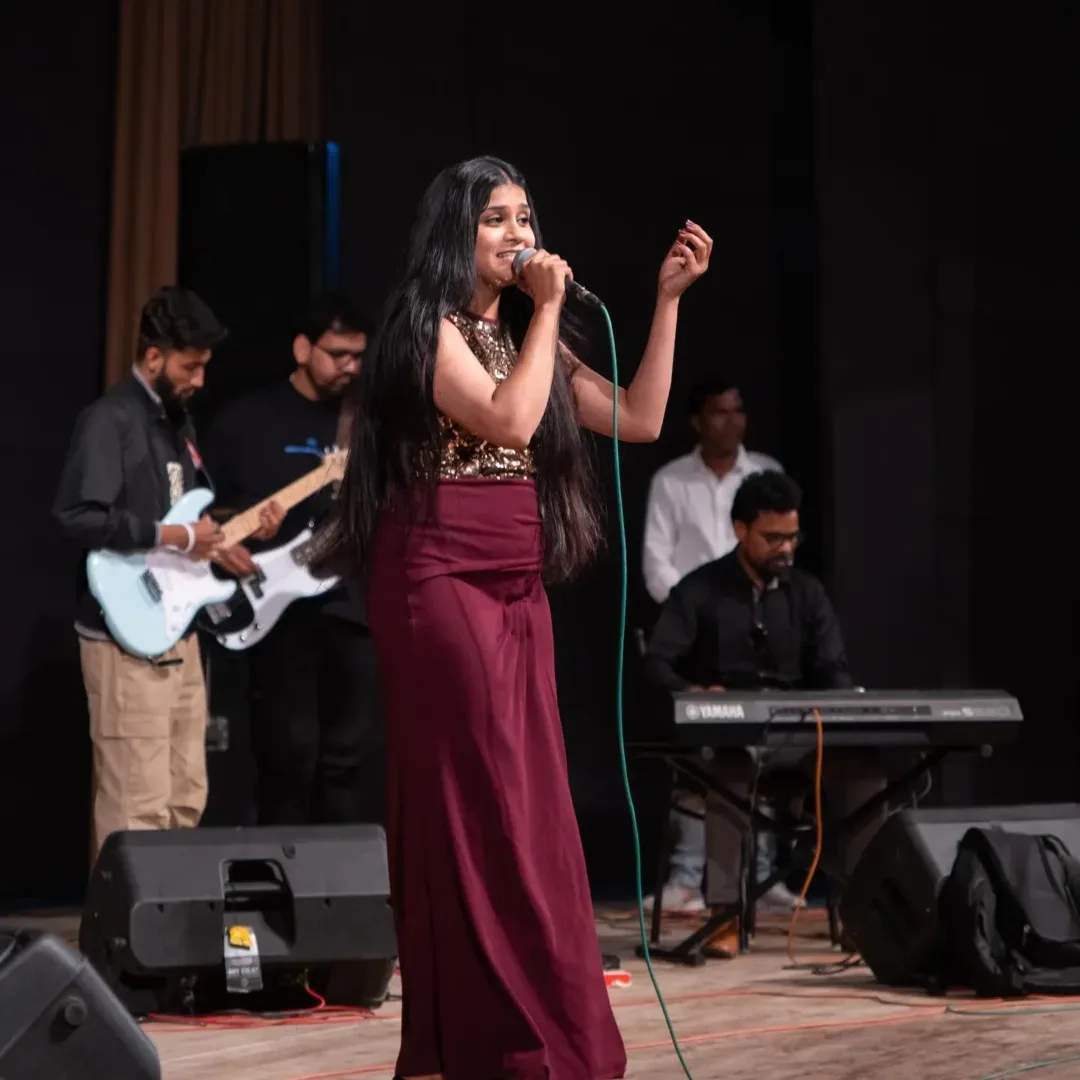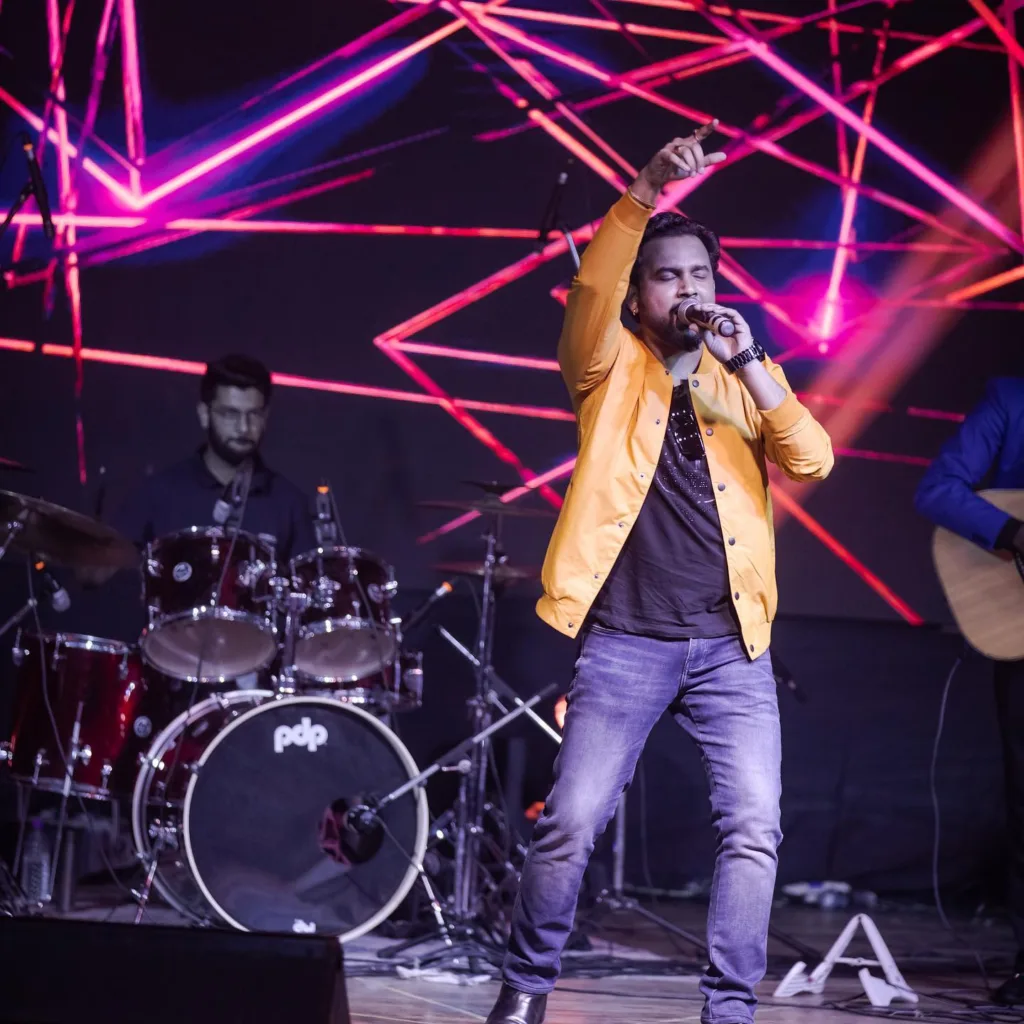
Book a Free Counselling Session 24-25
Ready to take your passion for music to the next level? Schedule your FREE career counseling session now! Contact us today to book your spot!

Module 1: Introduction to Indian Classical Music
Module 2: Basics of Vocal Technique
Module 3: Introduction to Ragas
Module 4: Advanced Raga Study
Module 5: Introduction to Talas
Module 6: Advanced Tala Study
Module 7: Compositions and Performance Practice
Module 8: Fusion and Innovation
Module 9: Music Appreciation and Critique
Module 10: Final Performance and Assessment
The key takeaway of this one-year course module on Indian Classical Singing includes:
Comprehensive Understanding: Students will gain a deep understanding of the fundamentals of Indian Classical Music, including Ragas, Talas, Swaras, and Shruti, along with the different styles within Hindustani and Carnatic traditions.
Vocal Technique Mastery: Through structured vocal exercises and techniques, students will develop strong breath control, range, flexibility, and articulation essential for proficient singing.
Raga and Tala Proficiency: Students will become adept in identifying, understanding, and performing various Ragas and Talas, exploring both basic and advanced compositions with improvisational elements.
Performance Skills: Emphasis on performance practice will equip students with the necessary skills to present traditional compositions with emotional depth and technical precision, preparing them for solo and collaborative performances.
Fusion and Innovation: Exploration of fusion concepts and modern approaches will encourage students to innovate while respecting the rich tradition of Indian Classical Music, fostering creativity and adaptability.
Critical Listening and Evaluation: Through listening sessions and critique, students will develop a discerning ear and the ability to analyze performances, enabling them to appreciate and evaluate music with depth and insight.
Final Performance Showcase: The culmination of the course will be a final solo performance where students demonstrate their acquired skills and artistic expression, marking the completion of their journey in Indian Classical Singing.
Boost sales by adding a beautiful background image with a blue button on the mouse hover.


Ready to take your passion for music to the next level? Schedule your FREE career counseling session now! Contact us today to book your spot!

Our course is affiliated with leading industry organizations, ensuring that our curriculum meets industry standards. Upon completion of the course, students receive a diploma certificate from MESC Skill, India, & Rock School of Music, London which is recognized globally & by the industry and can be used to gain employment in various music production and audio engineering roles. For more details visit www.angelsmusicacademy.com.it
In Indian Classical Music Classes, we'll start by teaching you the basics of Indian classical music, which is the foundation of Bollywood music. You'll learn about ragas, taal, and other key elements of this rich musical tradition.
We'll also cover vocal techniques such as breath control, voice modulation, and melody, which are essential for singing Bollywood songs. As you progress through the course, we'll explore the diverse genres of Bollywood music, such as romantic ballads, upbeat dance numbers, and soulful ghazals. Our experienced instructors will guide you through the techniques and styles that define each genre, and help you develop your own unique interpretation and style.
Whether you're a beginner or an experienced musician, our Hindustani Classical Singing Classes will provide you with the tools and guidance you need to develop your skills and deepen your understanding and appreciation of this rich and vibrant musical tradition.
We’re looking for future students who are inquisitive, passionate, original and determined to grow. Here we have best options in Bachelors in music. Your search for Best Music Colleges in world.
Shailu
Angel's is one of the best institutes in Jaipur for music training of any kind - vocal, instrumental, production, sound engineering, and more. I learned Western Classical, Western Rock and Pop and Music Production from here and had a great experience. They constantly keep evolving and improving their curriculum and the faculties are very knowledgeable too. 100% recommend for a growing budding musician.
Ishita Parakh
Heena Gupta
This is undoubtedly the best academy for music production in the country.
Owner and all the faculties here are so humble and experienced. Its a perfect choice.
Pranay Kumawat


The diploma course in Hindustani vocals at Angel’s Music Academy spans a duration of one year, consisting of comprehensive training and practical sessions.
The course will be taught by experienced and highly qualified instructors who are experts in the field of Hindustani classical music. Our faculty members are dedicated to providing personalized attention and guidance to each student.
While formal training is preferred, we welcome applicants with a genuine passion for music. All applicants must undergo an entrance audition to assess their musical abilities.
To enroll in the diploma course, interested candidates can visit the academy’s website or contact the admissions office for detailed information regarding the admission process, requirements, and deadlines
Admission open for the session 2024, For any queries reach us
B-39, Dev Nagar, Tonk Road, Jaipur-302018
info@theacdm.com
+91-7742823912

Module 1: Fundamentals of Western Vocal Technique
Module 2: Vocal Styling and Interpretation
Module 3: Repertoire Development
Module 4: Performance Skills and Stage Presence
Module 5: Music Theory for Vocalists
Module 6: Studio Recording Techniques
Module 7: Industry Insights and Career Development
Strong Foundation in Vocal Technique: Develop a solid understanding of proper vocal technique, including breath control, pitch accuracy, vocal range expansion, and vocal health maintenance.
Versatility in Contemporary Genres: Gain proficiency in singing various contemporary genres such as pop, rock, R&B, and soul, allowing you to explore and perform a wide range of songs.
Personalized Vocal Styling: Learn techniques to add your own personal flair and interpretation to songs, developing a unique vocal style that showcases your individuality as a vocalist.
Diverse Repertoire: Build a diverse repertoire of songs that demonstrates your versatility and ability to adapt to different musical styles and genres.
Stage Presence and Performance Skills: Develop confidence in stage performance, microphone techniques, and stage movement, enabling you to engage with the audience and establish a captivating stage presence.
Music Theory Knowledge: Acquire essential music theory knowledge specifically relevant to vocalists, such as scales, intervals, harmonization, and applying theoretical concepts to song interpretation.
Studio Recording Skills: Gain an understanding of studio recording techniques, including microphone selection and placement, vocal editing, and post-production processes, preparing you for recording sessions and studio environments.
Industry Insights and Career Development: Explore career opportunities in the music industry, understand marketing strategies for vocalists, and develop networking skills to foster professional connections within the industry.
Self-Promotion and Branding: Learn the importance of self-promotion and creating an artist brand, equipping you with the skills to market yourself effectively as a vocalist.
Growth and Confidence: Develop as a vocalist, grow in confidence, and unlock your full potential as you progress through the course, paving the way for future musical endeavors and opportunities.
Q1: Is prior singing experience necessary to enroll in the Western Vocal Course?
Q2: What age groups can enroll in the Western Vocal Course?
Q3: How long does the Western Vocal Course in Jaipur typically last?
Q4: Will I get performance opportunities during the course?
Q5: Can the Western Vocal Course lead to a career in the music industry?